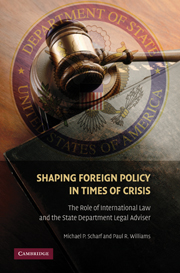 Shaping Foreign Policy in Times of Crisis
Shaping Foreign Policy in Times of Crisis Book contents
- Frontmatter
- Contents
- Acknowledgments
- Foreword: America's Conscience on International Law
- Introduction
- SHAPING FOREIGN POLICY IN TIMES OF CRISIS
- 1 The Compliance Debate
- 2 A Brief History of L
- 3 The Path to L
- 4 The Carter Administration – Herbert J. Hansell (1977–1979)
- 5 The Carter Administration – Roberts B. Owen (1979–1981)
- 6 The Reagan Administration – Davis R. Robinson (1981–1985)
- 7 The Reagan and Bush Administrations – Abraham D. Sofaer (1985–1990)
- 8 The Bush (41st) Administration – Edwin D. Williamson (1990–1993)
- 9 The Bush (41st) Administration – Michael J. Matheson
- 10 The Clinton Administration – Conrad K. Harper (1993–1996)
- 11 The Clinton Administration – David R. Andrews (1997–2000)
- 12 The Bush (43rd) Administration – William H. Taft IV (2001–2005)
- 13 The Bush (43rd) Administration – John B. Bellinger III (2005–2009)
- 14 Department of State Legal Advisers' Roundtable
- 15 Foreign Legal Advisers' Roundtable
- 16 Lawyering the Treatment of Detainees in the War on Terrorism
- 17 Conclusion
- Glossary of Terms
- Notes
- Annex: Legal Advisers of the U.S. Department of State
- Select Bibliography of Legal Scholarship by Department of State Legal Advisers
- About the Authors
- Other Books by the Authors
- Index
9 - The Bush (41st) Administration – Michael J. Matheson
Published online by Cambridge University Press: 05 June 2012
- Frontmatter
- Contents
- Acknowledgments
- Foreword: America's Conscience on International Law
- Introduction
- SHAPING FOREIGN POLICY IN TIMES OF CRISIS
- 1 The Compliance Debate
- 2 A Brief History of L
- 3 The Path to L
- 4 The Carter Administration – Herbert J. Hansell (1977–1979)
- 5 The Carter Administration – Roberts B. Owen (1979–1981)
- 6 The Reagan Administration – Davis R. Robinson (1981–1985)
- 7 The Reagan and Bush Administrations – Abraham D. Sofaer (1985–1990)
- 8 The Bush (41st) Administration – Edwin D. Williamson (1990–1993)
- 9 The Bush (41st) Administration – Michael J. Matheson
- 10 The Clinton Administration – Conrad K. Harper (1993–1996)
- 11 The Clinton Administration – David R. Andrews (1997–2000)
- 12 The Bush (43rd) Administration – William H. Taft IV (2001–2005)
- 13 The Bush (43rd) Administration – John B. Bellinger III (2005–2009)
- 14 Department of State Legal Advisers' Roundtable
- 15 Foreign Legal Advisers' Roundtable
- 16 Lawyering the Treatment of Detainees in the War on Terrorism
- 17 Conclusion
- Glossary of Terms
- Notes
- Annex: Legal Advisers of the U.S. Department of State
- Select Bibliography of Legal Scholarship by Department of State Legal Advisers
- About the Authors
- Other Books by the Authors
- Index
Summary
FIRST, I WANT TO SAY THAT I REALLY FEEL THAT THIS GROUP of public servants has contributed more to international law and U.S. foreign policy than any other group I know, and I'm very thankful to be included in it. Much of the work of the Legal Adviser's office, of course, is in giving legal advice and good counsel to senior officers in the handling of matters within their primary responsibility; but I think it is also the case that the Legal Adviser's office is given important projects over which it has primary responsibility, where it has to make both legal and policy judgments – where it has to develop positions within the Executive Branch and to conduct necessary negotiations with the Congress and with foreign governments. Today I want to discuss three examples of this that occurred during the time that I was Acting Legal Adviser and Principal Deputy.
The 1991 Persian Gulf War Legal Regime
The first occurred in the aftermath of the 1991 Gulf War, at a time when the Security Council was engaged in constructing a postwar regime to preserve the peace and, also, to deal with various aspects of the conflict. Of course, the legal vehicle for this postwar regime was a series of resolutions adopted by the Security Council under Chapter 7 of the UN Charter, an authority that had largely been dormant during the period of the Cold War.
- Type
- Chapter
- Information
- Shaping Foreign Policy in Times of CrisisThe Role of International Law and the State Department Legal Adviser, pp. 95 - 102Publisher: Cambridge University PressPrint publication year: 2010


